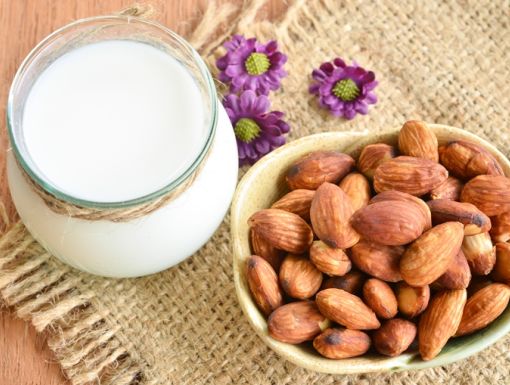
Which Milk Is Best?: A Guide to Milk and Milk Alternatives
Cow’s milk has ample competition these days, surrounded by an ever-growing array of “milk” made from almonds, cashews, peas, oats, hemp and other ingredients. Opting for one of these plant-based milk alternatives can make us feel like we’re doing something good for our bodies, but are they really any better for us? The answer is complicated, but our guide will help you better understand milk and milk alternatives and the role they play in our health and wellness.
A word on cow’s milk
All varieties of cow’s milk contain some level of naturally occurring growth hormones. Many types of milk are also made with the addition of rgGH or rbST, a synthetic growth hormone.
Cow’s milk also contains a significant amount of sugar – 12 grams per 8-ounce cup – in the form of lactose, a naturally occurring milk sugar. And with only 8 grams of protein in a cup, regular cow’s has 50 percent more sugar than protein.
Ultra-filtered milk – familiar in varieties like Fairlife and Trader Joe’s – improves these nutritional stats, with 50 percent more protein and 50 percent less sugar than regular milk. Maple Hill takes ultra-filtering even further with their Zero Sugar milk. Each of these still provides the expected benefits of milk, such as one third of a day’s worth of calcium and a hefty dose of vitamins A and D.
The scoop on plant-based milk alternatives
Most plant-based milks are made from nuts, seeds or grains that are mixed with water and salt; many of the major brands also include thickeners and emulsifiers like guar gum or gellan gum. (MALK, Forager and Three Trees are three brands that do not include any stabilizers or emulsifiers. Rather, they contain essentially just the nuts or seeds, water and potentially flavor enhancers like sea salt or vanilla beans.)
When it comes to plant-based milk, the protein content can vary widely, ranging from zero to 10 grams of protein per cup. Added sugar is one of the main drawbacks, with even “original” or “plain” varieties of many plant-based milks packing in nearly a day’s worth of added sugar.
The good news is that for those who wish – or need – to avoid cow’s milk for dietary, nutritional or environmental reasons, there is a milk alternative to suit nearly any taste preference, intolerance or sensitivity.
The key is to check labels closely to find the milk alternative that has most of the nutrients you’re looking for without the icky ingredients.
If you’re looking for a low-calorie, low-carb milk alternative that’s fortified with calcium and D, for example, then unsweetened almond milk, cashew milk, coconut milk or flax milk could each be a fit, with just 25-45 calories and 1 gram of carbs or less per cup.
But if you’re looking to get more of a protein boost from your non-milk milk while still keeping sugars in check, then an option like Ripple’s Unsweetened Pea Protein milk with 8 grams of protein may be a better fit. Another option would be a protein-fortified milk alternative like Orgain’s Organic Protein Almond Milk, which has 10 grams of protein per cup.
How does it taste, and which one is best?
When it comes to comparing the flavors, we’re definitely not comparing apples to apples. One isn’t necessarily better than the other, and taste, appearance and texture can vary widely. So, it really comes down to individual preference, and finding the best milk alternative for you may require a bit of trial and error.
What to look for on labels
Here’s what to look for on labels, what the numbers mean and why certain ingredients are added.
Calories: Just because it’s almond milk (or coconut, cashew or any other “milk”) doesn’t mean it’s low in calories. Depending on the type of milk and whether it’s sugar-sweetened, calories can range from a very-low 25 calories per cup to as much as 190 calories per cup.
Protein: Compared to 8 grams of protein per cup of cow’s milk, many non-milk alternatives fall short with as little as 0 or 1 gram of protein per cup. Some brands have a little more – 3 to 5 grams of protein – and still others are fortified with protein (often pea protein) to boost protein to 8 grams per cup.
Sugar (and carbs): If you see sugar listed on the nutrition facts label, this is almost always added sugar (such as organic cane sugar, dried cane syrup or brown rice syrup) and not the naturally-occurring milk sugar found in conventional cow’s milk.
Unsweetened varieties usually have little to no sugar, while the sweetened varieties can cram in as much as 28 grams – more than a day’s worth of added sugar – into a single cup.
Oat milk – even the unsweetened variety – is higher in carbs that most other milks. Cup-for-cup, unsweetened oat milk has about 50 percent more carbs and about 60 to 75 percent less protein than regular cow’s milk.
Calcium and Vitamin D: If you’re getting plenty of calcium and vitamin D from other foods in your diet, these nutrients are less critical to try to get from your choice of milk.
To schedule a nutrition consult, whether virtually or in-person, contact us at nutrition@ochsner.org or call us at 985-898-7050.
Keep in mind, however, that many of us don’t get enough of these. It’s estimated that 75 percent of Americans are deficient in vitamin D, and milk and milk alternatives are among the top sources of vitamin D in our diets. With that in mind, look for milk options with at least 30 percent of the daily value for calcium and at least 25 percent of the daily value for Vitamin D.
Nutrition summary of plant-based milk alternatives
For reference: 1 cup nonfat cow’s milk contains 90 calories, 12 grams carbs, 12 grams sugar, 8 grams protein
Low carb, moderate protein
Pea Protein Milk (original, unsweetened) – e.g. Ripple
Per cup: 80 calories, 0 grams carbohydrates, 0 grams sugar, 8 grams protein
Ingredients include pea protein, sunflower oil, algal oil, vitamin/mineral blend, water, sunflower lecithin, sea salt, organic guar gum, gellan gum
Orgain Organic Protein Almondmilk
Per cup: 80 calories, 4 grams carbohydrates, 0 grams sugar, 10 grams protein
Ingredients include filtered water, almonds, pea protein, vitamin/mineral blend, sea salt, gums (e.g. locust bean gum and/or gellan gum), sunflower lecithin
Protein-Fortified Flax Milk (original, unsweetened) – e.g. Good Karma Flaxmilk + Protein
Per cup: 60 calories, 1 gram carbohydrate, 0 grams sugar, 8 grams protein
Ingredients include filtered water, cold pressed flax oil, pea protein, vitamin/mineral blend, sunflower lecithin, sea salt, gellan gum, xanthan gum
Soy Milk (original, unsweetened) – e.g. Silk
Per cup: 80 calories, 4 grams carbohydrate, less than 1 gram sugar, 7 grams protein
Ingredients include non-GMO soymilk (water, organic soybeans), vitamin/mineral blend, sea salt, gellan gum
Low carb, low protein
Almond Milk (original, unsweetened) – e.g. Almond Breeze, So Delicious
Per cup: 25-30 calories, 1 gram carbohydrate, 0 grams sugar, 1 gram protein
Ingredients include filtered water, almonds, vitamin/mineral blend, sea salt, gums (e.g. locust bean gum and/or gellan gum), sunflower lecithin
Cashew Milk (original, unsweetened) – e.g. Silk, So Delicious
Per cup: 25-35 calories, 1 gram carbohydrate, 0 grams sugar, less than 1 gram protein
Ingredients include water, cashews, sea salt, locust bean gum, gellan gum, vitamin/mineral blend, non-GMO canola oil (in So Delicious cashew milk), almond butter (in Silk Cashew milk)
Coconut Milk (original, unsweetened) – e.g. Silk, So Delicious
Per cup: 45 calories, less than 1 gram carbohydrate, 0 grams sugar, 0 grams protein
Ingredients include water, coconut cream, vitamin/mineral blend, sea salt, sunflower lecithin, locust bean gum, gellan gum
MALK (original, unsweetened)
MALK is one of a growing number of brands on shelves without added thickeners, stabilizers or emulsifiers.
- Unsweetened Almond MALK: Per cup: 130 calories, 5 grams carbohydrate, 1 gram sugar, 5 grams protein. Ingredients: Organic almonds, Himalayan salt, filtered water
- Unsweetened Cashew MALK: Per cup: 100 calories, 5 grams carbohydrate, 1 gram sugar, 3 grams protein. Ingredients: Organic cashews, Himalayan salt, filtered water
High carb, low protein
Oat Milk (original, unsweetened)
Per cup: 90 calories, 19 grams carbohydrate, 2 grams fiber, 4 grams sugar (including 4 grams added sugar), 2 grams protein
Ingredients include oatmilk (water, oats), calcium carbonate, dipotassium, phosphate, sea salt, gellan gum, vitamin A, D2, riboflavin, vitamin B12
Rice Milk (original) – e.g. Rice Dream
Per cup: 120 calories, 23 grams carbohydrate, 10 grams sugar, 1 gram protein
Ingredients include water, brown rice, organic oil, sea salt
The bottom line
The answer to “Which milk is best?” really depends on which milk is best for you. Low carb, higher protein varieties exist for both cow’s milk and plant-based milks. Sugar and protein content vary widely, as do calcium and vitamin D. Start by identifying what matters most to you, in terms of taste preference, lifestyle needs and nutritional needs, and see which of the milk varieties best suits your needs and your wants.
Editor’s note: Registered dietitian Molly Kimball offers brand-name products as a consumer guide; she does not solicit product samples nor is she paid to recommend items.



